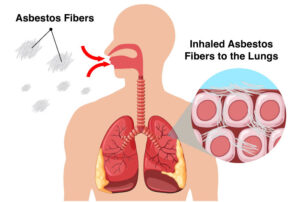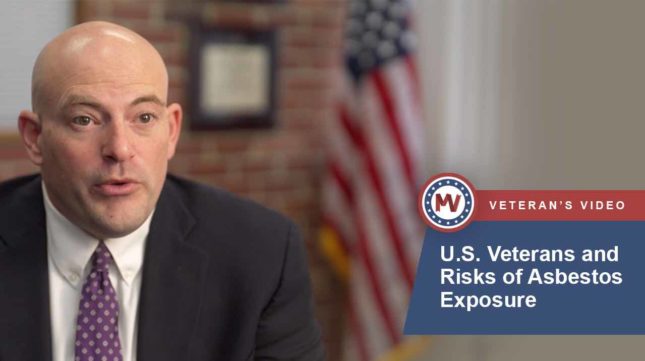U.S. veterans who served between the 1930s and early 1980s have a high risk of asbestos lung cancer. The U.S. military used asbestos for decades as makers of asbestos products hid the dangers. Veterans with asbestos-related lung cancer may qualify for military benefits and other compensation.
What Is Asbestos Lung Cancer?
Lung cancer is the second most common type of cancer, according to the American Cancer Society. While it has many possible causes (notably smoking cigarettes), thousands of people develop lung cancer every year because of asbestos exposure.
Video Summary: In this video, VA-accredited attorney Eric Hall explains why U.S. veterans are at risk of asbestos-related diseases like mesothelioma. He also breaks down how affected veterans can access military benefits and medical treatment. Call (877) 450-8973 to get started. View Transcript
Veterans who served in the military between the 1930s and the 1980s were likely exposed to asbestos while they were on active duty. Usually, if you've developed an asbestos-related disease, you developed that disease because you had an excessive amount of exposure to asbestos.
If a veteran believes they were exposed to asbestos while serving in the military, we encourage them to call the Mesothelioma Veterans Center so that we can work together to help them file for VA benefits.
The VA will recognize any asbestos-related disease as long as your asbestos exposure happened while you were on active duty in the military.
In addition to VA benefits, the Mesothelioma Veterans Center can connect veterans with world-renowned physicians and nurses on staff that can answer any of your treatment questions. We encourage veterans to call and find out how we can help them.
U.S. veterans have a high risk of lung cancer as the military used asbestos for decades in bases, vehicles, ships, and other products before the risks were known.
Today, the U.S. Department of Veterans Affairs (VA) recognizes the dangers of asbestos. Veterans with asbestos lung cancer or other asbestos-related diseases may qualify for VA benefits like monthly payouts and medical care.
Pursue compensation for asbestos-related lung cancer right now.
How Does Asbestos Cause Lung Cancer?
If asbestos-based products are damaged or wear out, they release tiny fibers into the air. People nearby can inhale asbestos fibers into their lungs. The fibers never leave the body and burrow into lung tissue, damaging the cells. This can eventually turn healthy cells into cancerous ones.


U.S. veterans who were exposed to asbestos at risk of getting sick. Many veterans were regularly exposed during their time in the military.
Veterans also have an increased risk of lung cancer caused by asbestos if they smoke. A recent study from the International Journal of Environmental Research and Public Health suggested that asbestos amplifies the lung damage caused by smoking cigarettes.
“Many studies have shown that the combination of tobacco smoking and asbestos exposure is particularly hazardous. However, there is also evidence that quitting smoking reduces the risk of lung cancer among asbestos-exposed workers.”
— National Cancer Institute
Lung Cancer vs. Mesothelioma
Asbestos exposure doesn’t always cause lung cancer — there are a number of asbestos-related diseases someone can be diagnosed with. One of the most notable is mesothelioma.
Unlike lung cancer, malignant mesothelioma tumors can develop in the lining of the lungs (pleura) or other major body parts. Mesothelioma tumors do not start in the lungs themselves.
Further, asbestos is the only known cause of mesothelioma — smoking is not a known cause or risk factor. However, both asbestos-related lung cancer and mesothelioma can be deadly without treatment.
Lung Cancer Symptoms
According to the American Lung Association (ALA), the symptoms of lung cancer can vary with each patient.
That said, common symptoms of lung cancer include:
- Appetite loss
- Chronic cough
- Extreme weight loss
- Pleural effusion (buildup of fluid in the lung lining)
- Shortness of breath
Many asbestos-related diseases share similar symptoms, but without prompt diagnosis and treatment, lung cancer symptoms can quickly worsen due to cancer spread.
Diagnosing Lung Cancer Caused by Asbestos
To diagnose lung cancer, your doctor will first gather basic facts about your health and your symptoms. From there, they will perform imaging scans of your chest cavity and lungs to look for cancerous tumors.
Imaging scans used to help diagnose lung cancer include chest X-rays, CT scans, MRI scans, and PET scans.
Imaging scans can also identify other pleural diseases — such as pleural plaques or pleural thickening (a painful inflammation of the lung lining) — that may mean someone has been exposed to asbestos.


Doctors often use a bronchoscopy to take a biopsy. During this procedure, doctors insert a small tube into the lungs to remove a tissue sample. Doctors then send the sample off to a lab to have it analyzed for cancer.
Prognosis for Asbestos Lung Cancer
If a biopsy confirms the presence of lung cancer, doctors can then offer a prognosis (expected health outcome). Lung cancer has a generally poor prognosis, whether it's caused by asbestos or not.
- A study from Cancer Science found that asbestos lung cancer patients had a life expectancy of 17.4 months.
- The average 5-year survival rate for lung cancer caused by asbestos was 25% in the same study.
- As of 2024, the overall 5-year survival rate for lung cancer was just 26.6%, according to the ALA.
Thankfully, a prognosis is not set in stone. With an early diagnosis and aggressive treatments, patients may be able to outlive an initially poor prognosis. Early-stage lung cancer patients who were diagnosed through CT scans can live for long spans of time. Roughly 80% were still alive 20 years after being diagnosed this way in a 2022 study from Mount Sinai Health System.
You may qualify for compensation to help you afford treatments that can improve your prognosis. Learn if you qualify right now.
Treatment for Asbestos Lung Cancer
Lung cancer is not curable, but treatments may help extend your lifespan and decrease your pain.
Notable lung cancer treatment options include:
- Chemotherapy: Chemotherapy uses drugs to kill cancerous cells.
- Radiation therapy: Doctors use high-energy X-rays to shrink tumors.
- Surgery: Doctors remove cancerous tumors and some or all of the affected lung.
- Targeted therapy: The patient is given medications to prevent cancer cells from spreading.
- Immunotherapy: Immunotherapy uses drugs to stimulate the body's immune system to target and kill cancerous cells.
- Clinical trials: Through a clinical trial, patients may be able to access new treatments currently being studied.
"Choosing the treatment that is right for you may be hard. Talk to your [lung cancer] doctor about the treatment options available for your type and stage of cancer."
— Centers for Disease Control and Prevention
U.S. veterans may be able to access free or low-cost asbestos lung cancer treatments if they have VA health care.
VA Benefits & Compensation for Asbestos Lung Cancer
U.S. veterans suffering from asbestos lung cancer can pursue medical care, military benefits, and private forms of financial compensation. Learn more about each of these below.
VA Benefits


Additionally, families can pursue survivor benefits to help them stay financially secure if a veteran passed away from lung cancer.
VA benefits are also available for other asbestos-related diseases. For example, the VA has granted benefits to veterans with asbestosis (a noncancerous disease that impairs breathing) and pleural plaques (a buildup of protein in the lung lining).
Compensation Claims
Through a private asbestos lung cancer claim, veterans may be able to receive more compensation than they would from VA benefits alone. These claims allow veterans to get compensation from the makers of asbestos-based products.
Compensation can help pay for lung cancer treatments and keep your family financially stable for years to come. No action is taken against any branch of the U.S. military, and you can still file for VA benefits even if you file a private claim.
Get a free case review to learn if you qualify for compensation after an asbestos lung cancer diagnosis.
Asbestos Trust Funds
Many makers of asbestos-based products filed for bankruptcy to avoid costly lawsuits. In response, the U.S. government forced these companies to set aside money in asbestos trust funds for current and future victims.
Today, U.S. veterans with asbestos lung cancer may be able to file a trust fund claim and receive compensation. Asbestos trust funds currently contain an estimated $30 billion. Filing a claim won't impact a veteran's ability to file for VA benefits.
Next Steps for Veterans With Asbestos Lung Cancer
Asbestos and lung cancer are forever linked due to the widespread use of this deadly substance before the 1980s.
If you or a loved one suffers from asbestos-related lung cancer or mesothelioma after military service, you can pursue financial aid and medical benefits. Both of these can help you adjust to life after a diagnosis and start the healing process.
The Mesothelioma Veterans Center knows the sacrifices veterans made and stands prepared to help those who need it. Get a free case review to determine your eligibility for asbestos lung cancer compensation.
Asbestos Lung Cancer FAQs
What is the life expectancy of asbestos lung cancer?
The life expectancy of asbestos lung cancer is 17.4 months on average, but you may be able to live much longer with treatment.
The VA reported on a U.S. Navy veteran who developed lung cancer from smoking and asbestos exposure. He was still alive over 15 years after his diagnosis.
Getting diagnosed and treated before your cancer has spread are key steps to help you live longer.
What type of lung cancer is caused by asbestos?
Asbestos can cause any type of lung cancer. This includes cases of small cell lung cancer and types of non-small cell lung cancers, like adenocarcinoma and squamous cell carcinoma.
Thankfully, treatments are available for any type of asbestos-related lung cancer.
Can your lungs recover from asbestos?
It depends. Treatments are often available for asbestos-related lung cancer. If your cancer is caught early on, you may be considered fully cured or become a long-term survivor.
The best way to start the healing process is to get prompt treatment.
Our team can help you afford lung cancer treatments: Call (877) 450-8973 to find out your eligibility.
Can I pursue legal action if I developed asbestos lung cancer?
It may be possible to pursue legal action following an asbestos lung cancer diagnosis. Contact our team today to learn if you may qualify for legal compensation.
If you do decide to file an asbestos lung cancer lawsuit, know that you can still file for VA benefits and that you won't sue the military or government.


